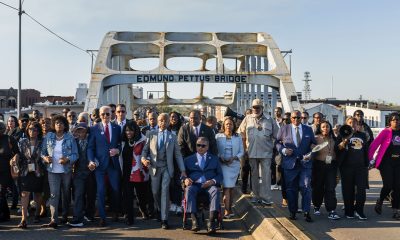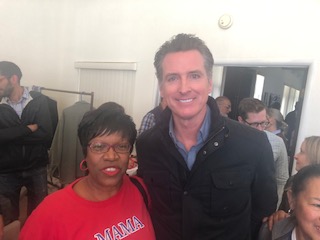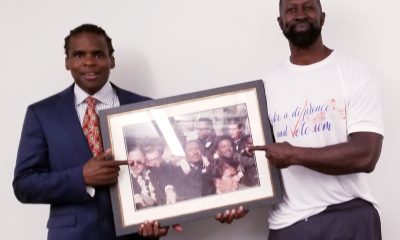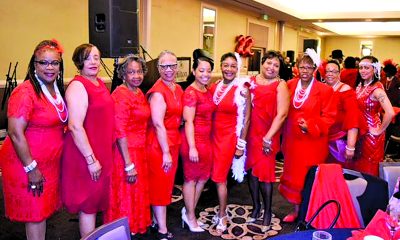Census
Dr. Maya Rockymoore Cummings Energized Black Women’s Groups at Local Event
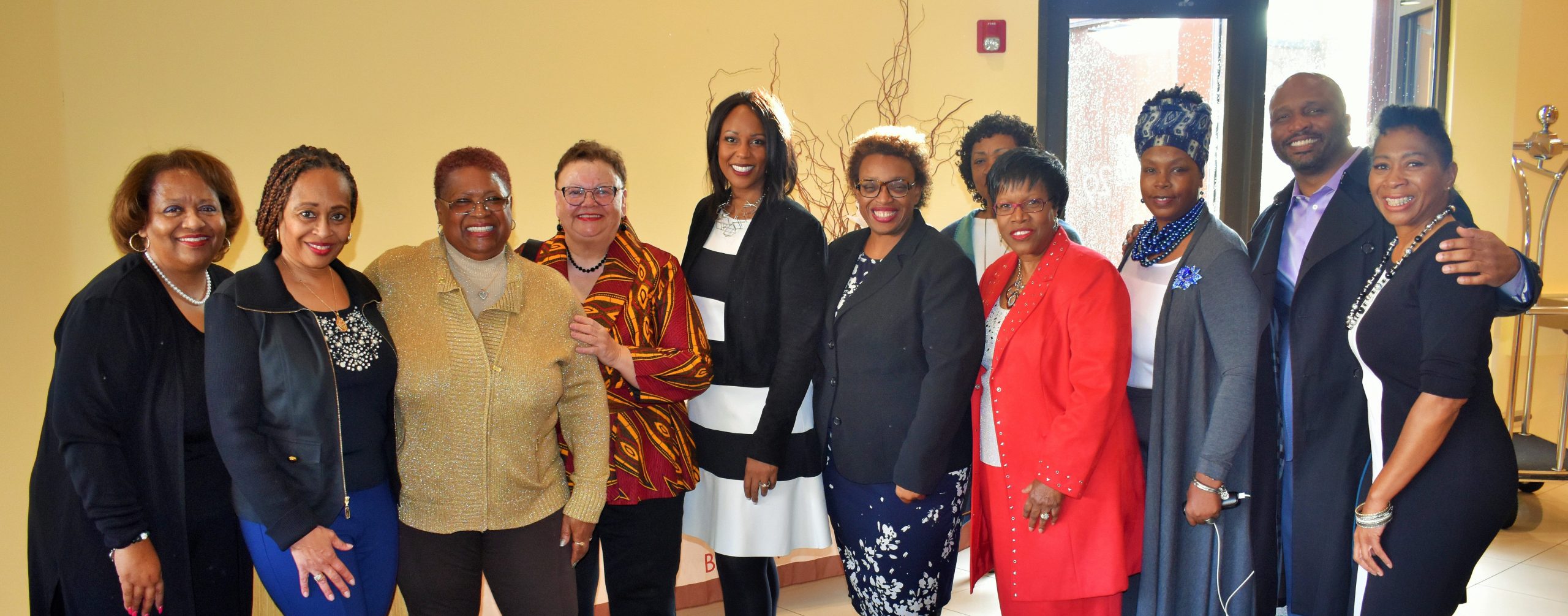
“Dr. Cummings, don’t think you’ll ever be alone,” said ‘Ladies in Red’ founder Brenda Knight. “We are here, we got you. You don’t have to worry. All you have to do is call BK. We going to pack it up and come out wherever it is.”
Knight was addressing congressional hopeful Dr. Maya Rockymoore Cummings in the Bay Area from Baltimore, Md., to gain name recognition as she prepares to run for the seat once held by her husband, the late Elijah Cummings.
Maya Cummings then delivered a rousing speech at an intimate meet-and-greet held January 16 at the Doubletree Hotel in American Canyon near Vallejo, sharing her plans with the audience on how she intends to pick up the mantel and move forward with her husband’s agenda.
Cummings told the group that their theme, ‘Trust Black Women’ in this election year of 2020 is absolutely right on target. “And let me add to that, trust Black women because Black women trust God,” she said. “This is a faith walk for me because on October 17th, I buried my loving, beloved husband and I’ve vowed to continue his legacy.”
In her opening comments, Cummings responded to the groups’ invitation to the event. “Black women are the strength of our community,” she noted. “We have been the backbone of not only the Democratic party, but also the strength of our families.”
“We give and we keep giving, and rarely do we think of ourselves. Sometimes, we fall down but we keep getting up and keep marching on. So, thank you for showing up and coming out. Thank you for being the strength of the community. And thank you for just being apparent about how we create change in our society. We need changes right now, more so than we’ve ever needed them.”
“I’m building upon Elijah’s life and legacy,” she said. “That means I’ll continue to fight for his efforts to preserve and protect our democracy. I will advance his work around universal health care and affordable prescription drugs. I have a broad agenda that focuses on what I call the HOPE agenda.”
“Hope stands for healthy and safe communities. It stands for more opportunities for youth, prosperous families and equitable economic development and economic justice. Each one of these things is often overlooked. It’s an agenda that absolutely needs to start. Hope for the future, hope for Baltimore, hope for our country and nation and hope to get this man out of the White House.”
The message Cummings wants to convey to her future constituents in the Baltimore area is that she will fight for them. “Elijah met me when I was fighting and we started fighting together,” said Cummings. “And now I am seeking to continue to fight because this is going to be a battle.
“It’s a battle for the future of our country, our democracy and our community. Civil rights are on the table, women’s rights, and human rights. You name it, it’s on the table and we need to fight and stand up for what we believe in, and that is a diverse, inclusive and prosperous country for all. We have a lot of work to do.”
Cummings’ second Bay Area appearance was later that evening at a fundraiser held for her at Geoffrey’s in downtown Oakland.
As one of the sponsors of the event, Knight closed out the meeting by noting that ‘Ladies in Red’ supports strong, Black women. “That is one of our primary goals,” said Knight. “And for those who are not strong, we try to help them along. That is why this event has been so wonderful, because Dr. Cummings is such a dynamic person. I can see that she is going to continue in the legacy of her husband.
“If I were able to speak to the people of Baltimore, I would tell them they have someone who has their interests at heart, in their mind, in their work habits, and you would want to vote for this person so that you can know that someone is looking out for you.
“You all know what her husband has done for you,” Knight went on. “She’s getting ready to pick up that mantel and continue his work. So support her, vote for her. Get out and tell people to vote for her. Because all across the nation, and right here in California, we’re getting ready to support her anyway we can to make sure that machine operates well when she becomes Congresswoman Maya Cummings.
The event was sponsored by the Solano/Napa Chapter of Black Women Organized for Political Action (BWOPA), Ladies in Red, the law office of Otis L. Jones, the Solano County Black Chamber of Commerce, the African American Alliance and the Napa Solano Central Labor Council.
Activism
Black Californians Among Those Discovering American Indian Lineage
The Dawes Act of 1887 gave each tribal family head 160 acres of land and each single person 80 acres. The government would hold the land title in a trust for 25 years, after which each individual would receive United States citizenship and a “fee simple” land title. Under this law, Black tribal members, known as Freedmen, were granted approximately 2 million acres of land.
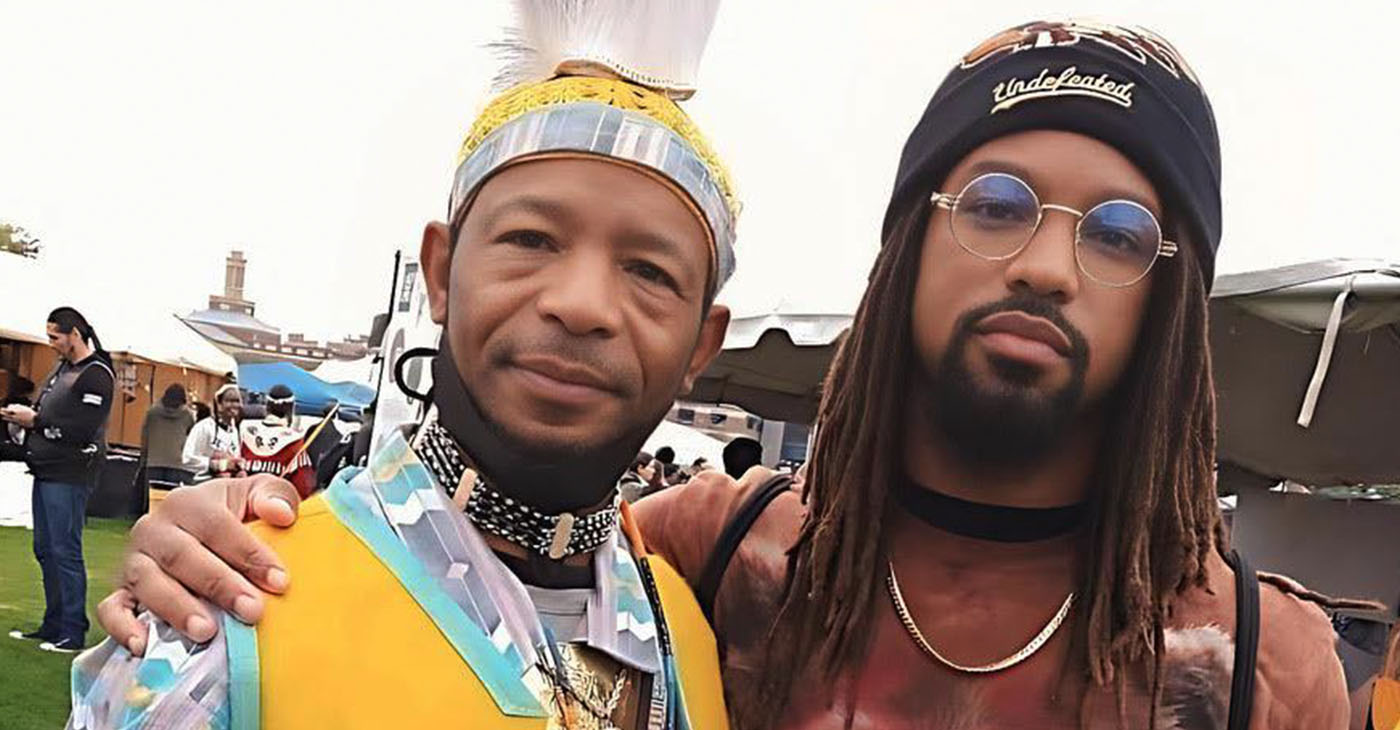
By Lila Brown, California Black Media
A growing number of Black Americans, relying on newly digitized federal records and other sources, are discovering direct bloodlines to Native American ancestors. These discoveries are inspiring individuals to trace and claim their Native ancestry, leading some to apply for citizenship with tribal nations.
When 32-year-old Daniel Bruce Kelly, an actor and minister, began researching his genealogy, he was sure that he would identify a family origin in Africa.
He identifies as African American and says he was determined to prove his parents wrong. They had begun discovering, exploring and embracing their European and Native American ancestry.
In his research, Kelly discovered that his great-great-great-grandfather was registered as Cherokee on the Dawes Roll, a United States government record listing individuals eligible for Indigenous tribal citizenship.
Kelly also identified other family members listed as Indian on U.S. Census Bureau records.
“At first, I was offended that my parents didn’t want to claim to be African, but then I had this awakening. You can’t talk about Native American history without talking about the Black American Indians,” Kelly said.
Similarly, Cameron Lewis, a truck driver from Sacramento, says he always heard family members talk about having “Indian in the family.” Delving into family documents, he found out that his great-great grandfather acquired land in the mid-1800s in areas of Florida inhabited by Seminoles.
“I found it hard to believe that whites would sell hundreds of acres of land to Blacks in the South during slavery,” he said. “This was when I started coming across terms I was not familiar with, describing my ancestors as ‘mulatto’ and ‘intransigent,’ and linking them to tribes such as the Yamasee, Catawba, and Creek — terms I’ve never even heard of.”
The Dawes Act of 1887 gave each tribal family head 160 acres of land and each single person 80 acres. The government would hold the land title in a trust for 25 years, after which each individual would receive United States citizenship and a “fee simple” land title. Under this law, Black tribal members, known as Freedmen, were granted approximately 2 million acres of land.
In Oklahoma’s Creek Nation, about a third of the land was Black-owned.
While the Emancipation Proclamation was signed by President Abraham Lincoln in 1863, slavery in the continental United States did not fully end as a legal institution until June 14, 1866, when the Creek Tribe agreed to abandon enslavement of African Americans. That was the day after Congress approved the Fourteenth Amendment.
Recent efforts to recognize historical injustices against Native Americans have seen progress. Last month, during Native American Heritage Month, Gov. Gavin Newsom issued a Proclamation celebrating the unveiling of a monument dedicated to California Native peoples at the State Capitol.
While this progress is appreciated, many Black Native Americans feel that the history of their Black freedman ancestors remains largely overlooked.
“We have to tell the whole of the story,” said Cherokee Nation Principal Chief Chuck Hoskin Jr. in 2022 during the 70th annual Cherokee National Holiday.
“We have to acknowledge that we enslaved African Americans under our own law. If we ignore or suppress that, we do to Freedmen and their descendants the same things that has been done to Cherokee people. Any nation is a stronger nation if they tell their whole story: the tragedy, the triumph, and the chapters that are dark and difficult,” added Hoskin.
According to the 2020 U.S. Census, approximately 1.4 million Californians identify as fully or partially American Indian and Alaskan Native. California also has the largest Native American population in the country, with close to 900,000 Native residents.
A population map commissioned by the Cherokee Nation in 2013 shows that California has the second-largest Cherokee population in the country after Oklahoma, where many displaced American Indians settled after the Trail of Tears in the 1830s.
In 2021, the Cherokee Nation Supreme Court removed the phrase “by blood” from its constitution. That change acknowledges that the descendants of Black people once enslaved by the tribe, the “Cherokee Freedmen,” have the right to citizenship, which means they are eligible to run for tribal office and to access other resources.
However, debates about who is — and who is not — Native continue.
For example, the great-great-great-grandmother of Kiori Jordan-Marquering, 46, of Santa Rosa, who was known as “Indian Julia,” was denied acceptance into the Choctaw Nation based on her appearance.
“She is visibly Negro,” the space reserved for “office use” on her application form noted.
“My ancestor’s application for citizenship was contested in court for more than three years before ultimately being denied,” says Jordan-Marquering.
Only the Cherokee Nation and the Seminole Tribe of Florida recognize Freedmen as eligible for citizenship.
This resource is supported in whole or in part by funding provided by the State of California, administered by the California State Library in partnership with the California Department of Social Services and the California Commission on Asian and Pacific Islander American Affairs as part of the Stop the Hate program. To report a hate incident or hate crime and get support, go to CA vs Hate.
#NNPA BlackPress
How Mitsubishi Will Survive – AutoNetwork Reports 365 – Auto Talk Show
Auto Talk show How Mitsubishi Will Survive – Jeremy Barnes, Sr. Director, Communications, and Events will discuss Mitsubishi now, electrification, the future, and how Mitsubishi remains relevant. Latest Automotive News and Car Reviews AutoNetwork Reports. Our panel discusses news from Toyota, Nissan, Buick, MBUSA, Ford, and more. Weekly car reviews and automotive news of interest. […]
The post How Mitsubishi Will Survive – AutoNetwork Reports 365 – Auto Talk Show appeared first on BlackPressUSA.

https://youtube.com/watch?v=1fpDYGl3tlQ&autoplay=0&cc_lang_pref=en&cc_load_policy=0&color=0&controls=1&fs=1&h1=en&loop=0&rel=0
Auto Talk show How Mitsubishi Will Survive – Jeremy Barnes, Sr. Director, Communications, and Events will discuss Mitsubishi now, electrification, the future, and how Mitsubishi remains relevant.
Latest Automotive News and Car Reviews AutoNetwork Reports. Our panel discusses news from Toyota, Nissan, Buick, MBUSA, Ford, and more. Weekly car reviews and automotive news of interest. We help you better understand and appreciate the auto industry. Find out why they would buy the vehicle or not. Join our panel of auto journalists influencers as we discuss this and simplify the latest auto industry news to help you appreciate the auto industry business. 365
The post How Mitsubishi Will Survive – AutoNetwork Reports 365 – Auto Talk Show appeared first on BlackPressUSA.
Bay Area
Bay Area Activist Seeks Congressional Seat in Newly Formed District 8
Last year, the California Black Census and Redistricting Hub pushed the California Citizens Redistricting Commission to draw a new congressional district to create consolidate the voting power of these diverse communities based on the results of the 2020 U.S. Census. (The new district now spans the I-80 corridor across Contra Costa and Solano counties, including Richmond, El Cerrito, Pittsburg, Vallejo, Fairfield, and a portion of Antioch, is the most diverse in the region.)
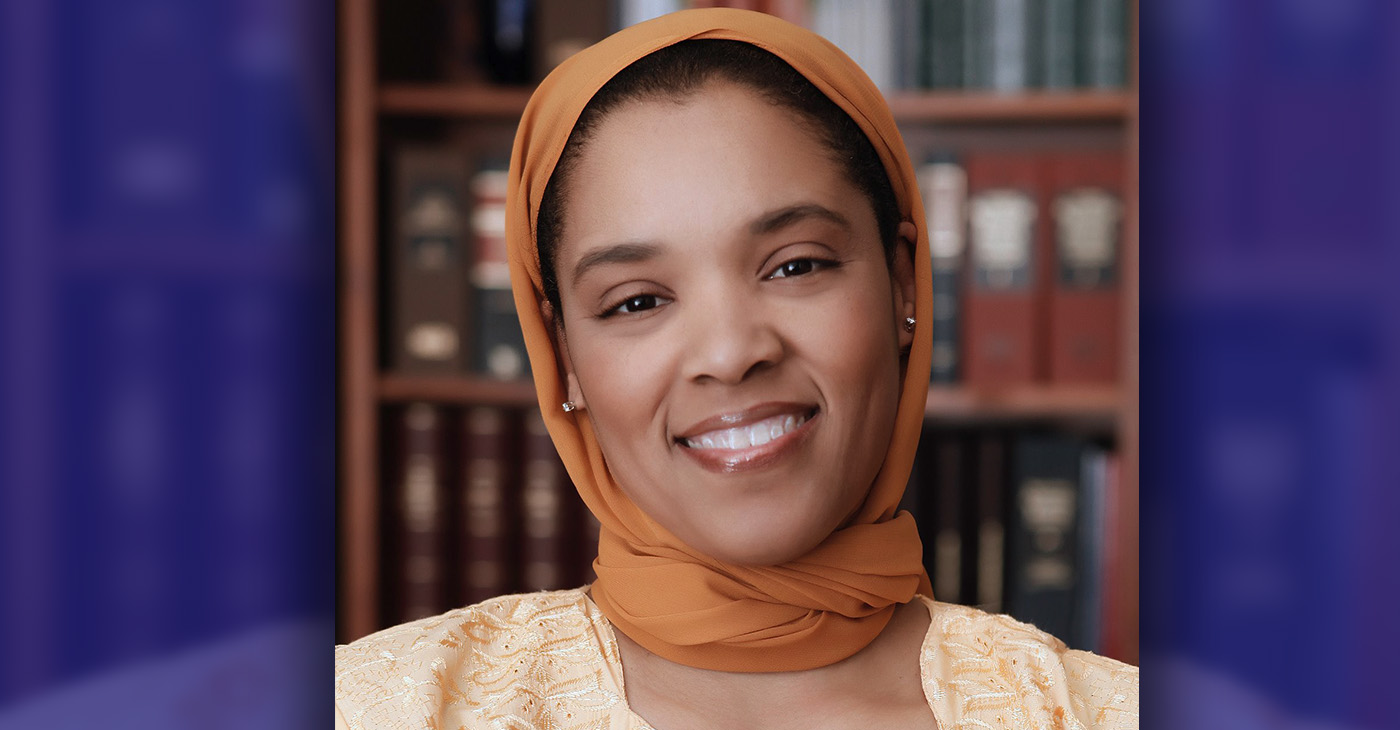
By Troy Finley
Cheryl Sudduth, a Bay Area community organizer and international negotiator, is seeking election as the first U.S. Representative for California’s new 8th Congressional district. She is challenging incumbent Democratic Congressman John Garamendi.
Last year, the California Black Census and Redistricting Hub pushed the California Citizens Redistricting Commission to draw a new congressional district to consolidate the voting power of these diverse communities based on the results of the 2020 U.S. Census.
(The new district now spans the I-80 corridor across Contra Costa and Solano counties, including Richmond, El Cerrito, Pittsburg, Vallejo, Fairfield, and a portion of Antioch, is the most diverse in the region.)
The commission agreed to the community concerns and ended up creating the only district in the entire state with at least 15% Latino, Black, white, and Asian populations. But it is also a district with areas of historically underserved and under-resourced communities and schools – where residents throughout struggle to find affordable housing, good paying jobs, public transit, and ongoing environmental hazards.
The five oil refineries located in the new district have large impacts on the local economy and public health of the local communities but can seem a world away from the Napa and Sonoma wine country. It is also a district that Garamendi believes he doesn’t have to reside in to represent it.
Once the new district was created, the next goal was to recruit a local person of color to represent it. Enter Cheryl Sudduth, a local community leader and government contracting officer… a candidate for the new seat.
As a multiethnic, multicultural, multilingual woman with disabilities, experienced in international contracting and environmental sciences, she fit the mold exactly.
“It was never in the plan to run,” said Sudduth. She was traveling back to the Bay Area from a water conference and got a call she never expected.
The campaign for Congress was a long shot from the start. “People were saying, she seems ‘fine’ but Congressman Garamendi is a veteran politician and someone who looks like me, who speaks like me, who moves like me could never get elected over him…maybe next time,” Sudduth recalls.
However, I believed then – as I do now – that the toughest fights are always worth taking on,” she said. “I’ve always been told that government only works when people, everyday people like you and me, raise our voices and demand change.
“Our communities have been so ignored,” she said, “I just feel like it’s our responsibility to show up and stand up for us against this continued effort to bring in people who do not live here yet always want to govern our communities.”
Her campaign has mostly been staffed with volunteers – Millennials, Gen Xers, lots of women. She has made a point to reject corporate donations and relies solely on small donors; nearly 70% of her campaign funds came from individual contributions under $200.
Despite Garamendi’s proclamation that it isn’t ‘legally required’ to live in the district, Sudduth believes that his perspective reflects the out-of-touch nature of the current Congress and the sort of nepotism that seems to thrive within the Democratic machine that believes it a perfectly suitable system that a community which is 70% people of color has never had a person of color represent them on the federal level.
“Our political differences are mainly on issues of economic and racial justice,” she said. “He wants to represent us but doesn’t want to live among us? That’s why he’s not effective for us. He doesn’t have a stake in the game.
“I do have the advantage of being able to connect with the people of the community,” she said. She lives in the district near industry, which gives her firsthand experience with income inequality, housing and homeless issues, educational inequities, and racial injustices. “Frankly, anyone who doesn’t live in the district, hasn’t sent his children to our schools, spent with our small businesses and pay taxes here regularly, doesn’t drink our water or breathe our air, cannot possibly represent us.”
Suddoth believes she has a gift “resolving issues. So, every position I’ve held from Sony to Siebel/Oracle and Goodwill, AbilityOne, U.S. President’s Commission for People who are Blind or Disabled and Mattson Technology and now AC Transit, my elected office and appointed commissions, creating thousands of federal jobs, building housing, establishing healthcare programs – I have consistently delivered award winning solutions and community resources by focusing on the fix and not just the fight.
She also has direct experience in international contracting, having lived and worked in over a dozen countries managing and negotiating contracts in nine languages, in water and wastewater, in the environmental sciences, in creating jobs and overseeing fair housing projects, and equity advocacy.
Suddoth and members of her campaign are grateful for the many people who have endorsed her including ILWU Local 10, PEU 1, LAAAWPAC, former San Francisco Mayor Willie Brown, former Richmond Mayor Irma Anderson, former Oakland Mayor Elihu Harris, and hundreds of elected, appointed officials and commissioners.
-

 Activism4 weeks ago
Activism4 weeks agoOakland Post: Week of March 20 – 26, 2024
-

 #NNPA BlackPress3 weeks ago
#NNPA BlackPress3 weeks agoCOMMENTARY: D.C. Crime Bill Fails to Address Root Causes of Violence and Incarceration
-

 #NNPA BlackPress3 weeks ago
#NNPA BlackPress3 weeks agoMayor, City Council President React to May 31 Closing of Birmingham-Southern College
-

 #NNPA BlackPress3 weeks ago
#NNPA BlackPress3 weeks agoCOMMENTARY: Lady Day and The Lights!
-

 #NNPA BlackPress3 weeks ago
#NNPA BlackPress3 weeks agoFrom Raids to Revelations: The Dark Turn in Sean ‘Diddy’ Combs’ Saga
-

 #NNPA BlackPress3 weeks ago
#NNPA BlackPress3 weeks agoBaltimore Key Bridge Catastrophe: A City’s Heartbreak and a Nation’s Alarm
-

 #NNPA BlackPress3 weeks ago
#NNPA BlackPress3 weeks agoBaltimore’s Key Bridge Struck by Ship, Collapses into Water
-

 Activism3 weeks ago
Activism3 weeks agoOakland Post: Week of March 27 – April 2, 2024

